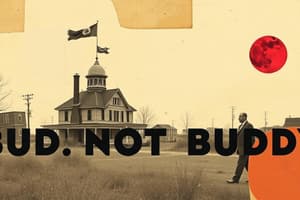Podcast
Questions and Answers
During the Great Depression, what was a common reason for families, similar to Bud's, to migrate in search of better opportunities?
During the Great Depression, what was a common reason for families, similar to Bud's, to migrate in search of better opportunities?
- To join the military and serve in overseas conflicts, contributing to the war effort.
- To escape political persecution and seek asylum in neighboring countries.
- To follow rumors of plentiful jobs and escape the widespread unemployment, as well as the difficult Jim Crow South, as experienced by African Americans. (correct)
- To find employment in booming industrial sectors and escape rural poverty.
How does the depiction of Hoovervilles in Bud, Not Buddy reflect the broader social and political context of the Great Depression?
How does the depiction of Hoovervilles in Bud, Not Buddy reflect the broader social and political context of the Great Depression?
- It romanticizes the experience of homelessness and portrays it as a carefree adventure for young boys.
- It highlights the success of government programs in providing adequate housing for displaced families.
- It celebrates the resilience and self-sufficiency of communities during times of economic hardship.
- It serves as a critique of the government's failure to address the needs of the poor and unemployed, revealing the human cost of economic collapse. (correct)
In Bud, Not Buddy, what does Bud's encounter with Herman E. Calloway and his band reveal about the complexities of identity and belonging during the 1930s?
In Bud, Not Buddy, what does Bud's encounter with Herman E. Calloway and his band reveal about the complexities of identity and belonging during the 1930s?
- It highlights the unifying power of music in transcending racial and social barriers.
- It emphasizes the challenges of defining oneself in a society marked by racial segregation and economic inequality, while underscoring the importance of finding one's roots. (correct)
- It demonstrates the importance of adhering to traditional family structures and values.
- It suggests that personal relationships are secondary to economic success and social status.
How does the author Christopher Paul Curtis use jazz music in Bud, Not Buddy to represent the African American experience of the 1930s?
How does the author Christopher Paul Curtis use jazz music in Bud, Not Buddy to represent the African American experience of the 1930s?
Imagine you are advising Bud on how to navigate the challenges he faces in finding a place to belong. Based on the historical context of the Great Depression and racial discrimination, what strategies would you recommend to him?
Imagine you are advising Bud on how to navigate the challenges he faces in finding a place to belong. Based on the historical context of the Great Depression and racial discrimination, what strategies would you recommend to him?
Flashcards
DOK Level 1: Recall
DOK Level 1: Recall
Understanding basic facts, terms, and information.
DOK Level 2: Skill/Concept
DOK Level 2: Skill/Concept
Applying comprehension and skills to interpret, compare, and classify.
DOK Level 3: Strategic Thinking
DOK Level 3: Strategic Thinking
Requires strategic thinking and reasoning to analyze and draw conclusions.
DOK Level 4: Extended Thinking
DOK Level 4: Extended Thinking
Signup and view all the flashcards
Assessment
Assessment
Signup and view all the flashcards
Study Notes
- Read your class novel or story series with social studies standards in mind.
- Identify key social studies concepts within the text.
- Develop activity objectives related to these concepts.
- Take into account the specific social studies standards you will address.
- Utilize an AI assessment generator like Quizgecko or Quizlet.
- Create an assessment with a minimum of 10 questions.
- Include at least 3 questions targeting Depth of Knowledge (DOK) Level 1.
- Include at least 3 questions targeting Depth of Knowledge (DOK) Level 2.
- Include at least 2 questions targeting Depth of Knowledge (DOK) Level 3.
- Include at least 2 questions targeting Depth of Knowledge (DOK) Level 4.
- Apply these steps to the book "Bud, Not Buddy" by Christopher Paul Curtis.
Studying That Suits You
Use AI to generate personalized quizzes and flashcards to suit your learning preferences.
Description
Explore social studies concepts within 'Bud, Not Buddy'. This includes activity objectives aligned with social studies standards. The assessment includes questions across DOK levels to deepen understanding.




